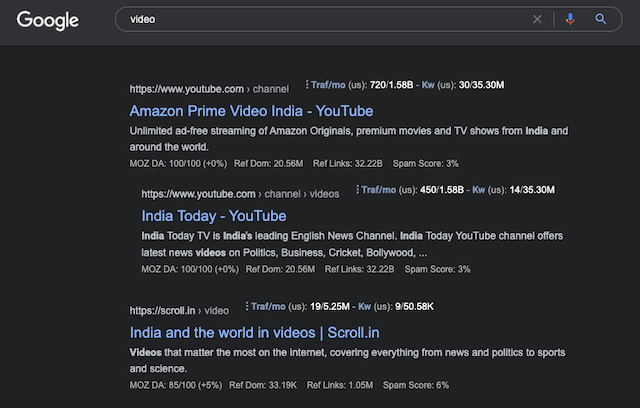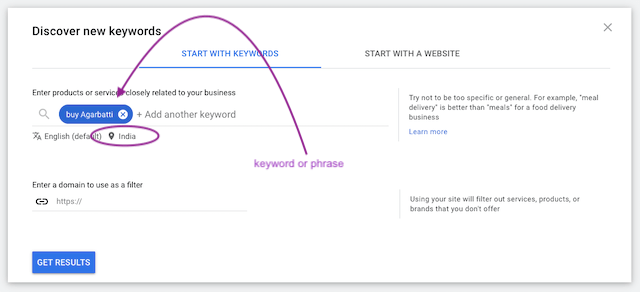The Indian e-commerce industry is expected to grow 84% over the next two years. If you want to be a part of the growth story, you cannot ignore the search engine optimization (SEO) of your e-commerce website. And the first step to SEO is keyword research. So how will you find SEO keywords for your e-commerce store?
38% of total traffic to e-stores comes from search engines.
This post will explore how you can do effective e-commerce keyword research to find profitable SEO keywords for your e-store. Also, you will come to know common mistakes you should avoid while doing keyword research to maximize SEO success.
Without further ado, let’s dive in.
Why is e-commerce keyword research necessary?
India has more than 150 million online shoppers. When they look for something online, search engines like Google will display a handful of results based on relevancy from hundreds of thousands of web pages.
Suppose you don’t include relevant SEO keywords or phrases in your e-commerce content (product title, description, metadata, etc.). In that case, search engines will not relate your products with customers’ queries pertinent to your business. Consequently, your e-commerce website can lose chances of ranking on search results.

Also, customers will not find your product pages through product search on your e-commerce website if you don’t add keywords/phrases they use while searching for products or services like yours.
So, keyword research is vital for the success of your e-commerce website. Without having done proper keyword research, you cannot think about the search engine optimization of your e-commerce website.
Five steps to find SEO keywords for your e-commerce store
The following five steps will help you discover SEO keywords for your e-commerce store:
1. Brainstorm to find an initial list of keywords
You create an initial list of keywords for your e-commerce website through brainstorming. The objective here is to prepare a list of possible key phrases your customers use to find your business online.
Call your team members, and start writing down keywords or phrases each of you uses to find your business on search results.
Start with keywords that include two words first. Then, you can go for long-tail keywords, which have four words or more (e.g. restaurants open near me).

It can be daunting to brainstorm initial keywords or key phrases relevant to your business. But the exercise is worth your time, as this list will help you bring more customers to your business.
You can include your friends and family members in this exercise to broaden the horizon.
Request them to find your business online, avoiding using your brand name or product name. Note down what terms they are using and links they click to come to your e-commerce website finally.
Doing this exercise with your friends and family members will offer you real-world insights, which will improve your list of initial keywords a lot.
2. Keyword research with Google Keyword Planner
Google Keyword Planner is a great tool to refine your lists of initial keywords/phrases that you have prepared through brainstorming.
Google Keyword Planner can help you:
- Find the keywords people are using to search for businesses like yours
- Look at search volume forecasts to know how your chosen keywords/phrases could perform in the future

Google Keyword Planner allows you to discover new keywords in two ways — one is starting with keywords, as shown above, and another is starting with a website. So, you can either use your list of initial keywords or your website to find new keywords relevant to your business.
You can use the Google Keyword Planner tool to work on your list of initial keywords to find the best keywords/phrases that represent your business accurately, considering search volume and competition.
Here are some other keyword research tools you can try:
- Ubersuggest
- SEMrush
- KWFinder
- Keyword Explorer by Ahrefs
3. Focus on relevance
When you’re reviewing your keyword list, you should focus on relevance.
In other words, does the keyword or phrase relate to what your business provides?
You can find many SEO keywords that you can easily rank. But if they have nothing to do with your business, there is no purpose in including them in your keyword list. So pull those keywords out of your keyword list.
Fifteen qualified leads (i.e. people who have shown an interest in your business) are much better than 100 visitors who will not buy anything from you and leave your website quickly.
4. Conduct competitive research
Keeping tabs on your competitors can be an easy yet efficient way to find SEO keywords for your e-commerce website. And the best part is, you won’t have to spend tons of time and effort to do so.
Here are a few simple steps to conduct competitive research for finding profitable keywords for your e-store:
- Type your target keywords in search engines
- Make a list of the top 15 e-commerce websites that are similar to yours
- Use the tool like Ubersuggest, Ahref, or SEMrush to explore keywords for which these e-commerce websites are ranking
- Pick the keywords relevant to your business and include them in your keyword word list
5. Look for Amazon Suggest
Amazon is the biggest online retailer in the world. Even if it is not your competitor, Amazon can help you learn valuable insights about what people are searching for.
Just type your target keyword in Amazon search and see what Amazon suggests. Pick the relevant keywords and phrases and include them in your keyword list.
Amazon Suggest tends to offer you long-tail keywords that are valuable for the long-term SEO health of your e-commerce website.
Common keyword research mistakes
When doing keyword research, you should avoid making the following mistakes to maximize your SEO success.
1. Focusing on your business and ignoring the audience
You should keep your prospects and customers in mind when doing keyword research for your e-commerce website. Avoid using your brand name or product name as a keyword, unless you are famous and your audience searches you with such a keyword.
Focus on how your audience tries to find the products/services you offer.
2. Overstuffing content with keywords
Long gone are the days when stuffing your website with keywords improves SEO. Now, doing the same can attract penalties from search engines, affecting your e-commerce website adversely.
So, you should use the target keywords naturally in the content of your e-commerce website. Try to mention your keyword once for every 100 words on the page.

3. Not using SEO keywords in URLs
Though it doesn’t have much weightage these days, using relevant keywords in the URLs of your e-commerce website can help in SEO. Moreover, keywords in URLs can help your audience understand what pages are about.
4. Ignoring Alt text for images
Search engines cannot interpret images. And your e-commerce website must be using hundreds of images.
Using Alt Text, which search engines can read, you can solve this problem and let search engines know what images are about. If you use Alt text strategically, it can improve the SEO of your e-commerce website.
When you buy GoDaddy's Online Store Builder, you will get many solutions to reach customers easily. It even helps improve your rank on Google, Yahoo and Bing by automatically reviewing your site and adding relevant, high-value keywords and phrases.
Spend some time finding your SEO keywords
The e-commerce industry is snowballing in India. If you want to carve a niche for your e-commerce website, you have to find the right SEO keywords to improve the visibility of your e-store on search results.
The tips and strategies mentioned above can nudge you in the right direction to discover profitable keywords for your business.






